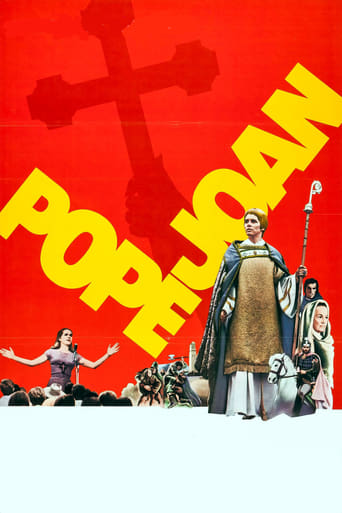Marcin Kukuczka
In the Middle Ages, there were a lot of legends and tales about people whose lives attracted the society. From today's perspective, we could call them a sort of "medieval sensations." One of such was promoted by Martin of Opava (also known as Martin the Pole) through his work "Chronicon Pontificum Et Imperatum". This allegedly inspired a legend about a simple girl named Joan born in Mainz who joined the abbey and desired only to be a faithful nun. However, her biggest problem was the lust she could not resist, lust towards men. When she found a way to fulfill her carnal pleasures, that did not suffice. Joan struggled for more...for power in church. Having got the education at Athens, she left for Rome disguised as a man where she preached the word of God and soon became a cardinal and, in 852, the head of the Holy See. This legend was never found true, some of the Church hierarchies considered it anti-papal satire, some ignored it. Yet, in 1972 Michael Anderson decided to make a movie.As the theme could be quite interesting for the script, the film generally does not do a good job. Although its beginning is pretty interesting and involving constituting a nice presentation of Joan's childhood and her desire for knowledge, later, it spoils a lot. Some serious mistakes that concern introducing historical reality result in poor effects and disappointment. The Roman Catholic Church is showed in a negative manner: monks appear to be ruled only by flesh and rape Joan before she enters the convent; there is practically no chastity among clergy and nuns. Joan takes the forbidden fruit and, having seen that the man she likes makes love to another nun, goes to her room and masturbates. Papal Rome is corrupted and accepts cardinals whoever there is at hand. Those are seriously wrong aspects that supply the viewer with a manipulated vision of Catholics and Church history. But, among them, what made me most angry was the mention of St Thecla. She was, according to the legend, a martyr in Nero's Rome and, most probably, a companion of St Paul in his journeys. She did not have the power as it is mentioned in the film but she only served the Apostle the same way Mary Magdalene served the Apostles. It was a pure female service short of search for power or for satisfaction. And here, Joan justifies her deeds saying that St Thecla had the power as a female. So as for the execution of the story, I would rate this film as 1/10. But fortunately, I can also find something positive about the movie, too.The strongest point of POPE JOAN are the cast. Liv Ullman fits very well to the lead. She not only expresses desire in a convincing way but also feelings sublime, feelings of faith. The best of her scenes is, I think, the moment Joan consoles the dying. Young Sharon Winter who plays Joan as a child also does a memorable job and the moment she reads the Bible to the elderly and is applauded is both involving and unforgettable. Franco Nero is perfect as Louis who has a taste for girlish women and powerful companions. There is also some little nice part of Lesley Anne Down who portrays innocent-looking nun Cecilia. But three great stars of cinema really rock: these are Trevor Howard, Maximilian Schell and Olivia De Havilland. Howard is marvelous as Pope Leo for whom the most horrific hell would be an eternal bath in cold water. Olivia De Havilland convincingly depicts Mother Superior in the convent. Maximilian Schell is terrific as Adrian, the painter who lets young maid-nun try the Forbidden Fruit and female preacher-cardinal-pope use Forbidden Rights.But coming back to the content, one thing made me quite confused...even if the story would have some "history" (I now refer more to Martin of Opava), how is it possible that no one recognized a woman in Pater Johanes, Cardinal Johanes and finally the pope Johanes? The pope Leo was only suspicious about "his" lovely gentle hands... In the film, it is Louis (Franco Nero) who manages that and in the most shocking scene, he starts to make love to the female pope. However, historically, it's a total fairy tale. As for the Saracens, there is no such mention even in Martin's.Good use is made of music in the film but much more the musical score than the Gregorian chants that we hear from time to time. The Gregorian chant was absolutely different those days, most of the melodies resemble much later Middle Ages than the 9th century period. Yet, there appears one of the most popular hymns of the Church attributed to Rabanus Maurus (776-856) "Veni, Creator Spiritus". Difficult to say if it had that melody but indeed beautiful sung till now at important moments. By the music, however, I mostly mean the background to the scenes: delicate, profound, nice to hear. Consequently, the soundtrack from the movie would be interesting to get.All in all, this film in its content should be treated like some movies on important religious themes recently made - all is a fairy tale, just a resemblance of the director's imagination with serious historical flaws. Hope this movie will not be harmful for anyone... 4/10
loza-1
Based on a supposedly true story of an Englishwoman who became pope for a short time and was lynched by a crowd after giving birth, this film could have been done much better, since the story on which it is based - true or not - is little more than a footnote in history.Being set among cardinals and clergy, there was a marked lack of intrigue. The clandestine affair from which pope Joan's child was conceived is a sordid, grotty scene, totally lacking any passion. The final scene, where the crowd lynch their pope, was little more than a playground brawl.Because this film was such a disaster, I do not see any film maker daring to touch this subject again. So we can therefore regard this film as an opportunity well and truly wasted.
moonspinner55
"Pope Joan" always gets panned in movie review tomes and, worse, the final edit of the picture was severely tampered with by the studio, yet the picture does have some merit, particularly in the performances (which are all excellent). Based on a popular legend about a 9th century nun who disguises herself as a man and--after some rather innocent deception--becomes Cardinal in Rome and later Pope. Good-looking picture was hacked up in post-production, giving the end result a half-baked feel, but I loved Liv Ullmann's work in the lead and Maximilian Schell is very sexy as a randy monk. Worth a look for Liv's admirers. **1/2 from ****
Neil Doyle
There is not much one can say about 'Pope Joan' except that it was a huge failure with critics and the public, opening in New York for a brief run of nine days before being yanked into oblivion. This is another of those all-star films popular in the '70s, totally wasting a talented cast--and again, you have to wonder if anyone really read the script before agreeing to do the film. Look at the cast...Liv Ullmann, Trevor Howard, Maximilian Schell, Keir Dullea, Olivia de Havilland, Lesley-Anne Down. The color photography is great and the choral music in the background score is impressive--but the notion that a credible story could be made based on an unfounded legend of a woman who briefly became Pope Joan in the 9th century, is one that would have defeated even the best screenwriter. Given limited release in Europe and only a few showings in the USA, let's hope this is one film that never gets a restoration. No one is seen to advantage--an embarrassment for all concerned. As noted by Tony Thomas in his book, "Films of Olivia de Havilland": "It is a pity to see so many fine actors wallowing in medieval mire."




